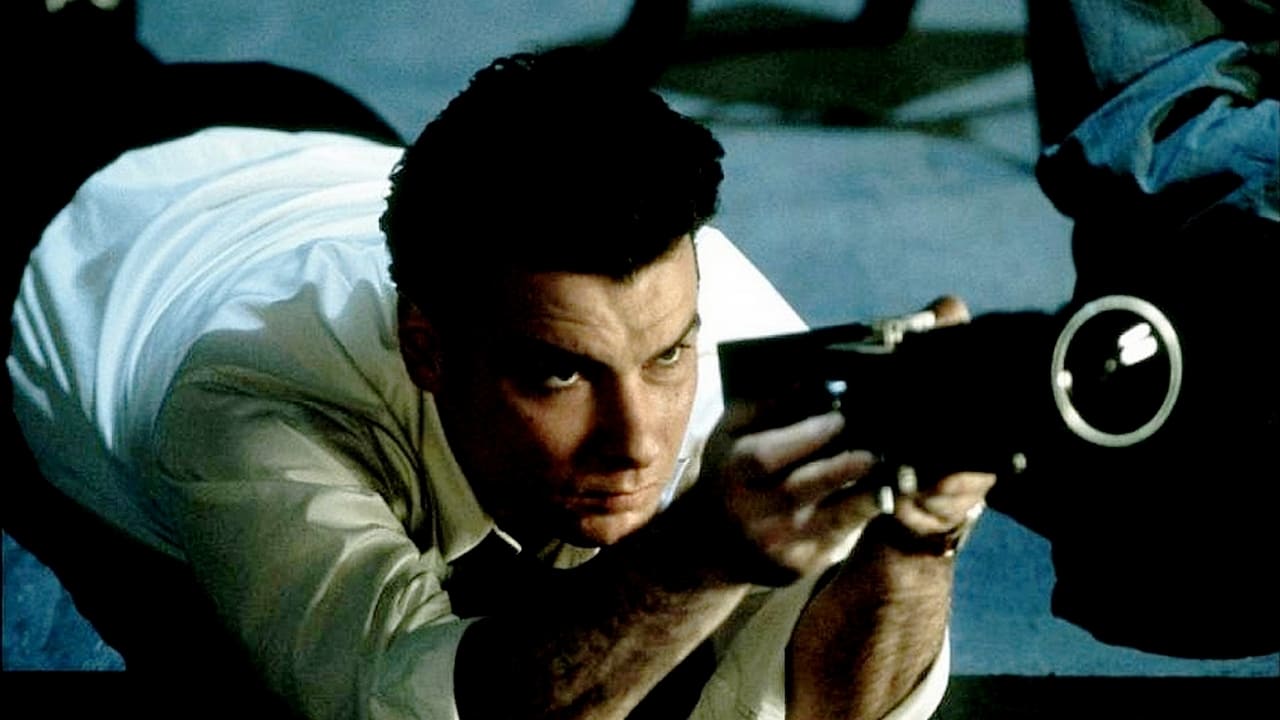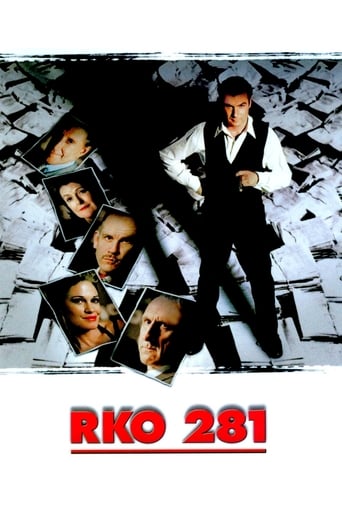Matrixston
Wow! Such a good movie.
Laikals
The greatest movie ever made..!
Jakoba
True to its essence, the characters remain on the same line and manage to entertain the viewer, each highlighting their own distinctive qualities or touches.
Gary
The movie's not perfect, but it sticks the landing of its message. It was engaging - thrilling at times - and I personally thought it was a great time.
Sober-Friend
Orson Welles (Liev Schreiber), all charisma and stubborn vision, is signed to direct films for RKO Pictures with a startling amount of creative freedom. Welles decides to make production number 281 a disguised biopic of media tycoon William Randolph Hearst (James Cromwell), a film which would come to be known as "Citizen Kane." But Welles doesn't understand just how much clout Hearst yields. When he gets word of the unflattering production, Hearst does everything in his power to stop it.The power of this film is how "Money and Power" can crush art which makes this scary. The main focus of the film is what "Is Right" what is "Wrong"! This film reminds me when Universal had a fight with religious groups about the film "The Last Temptation of Christ" What is also "Said without being said" is "You Can Win the War" but there is also a price! You pay the price but so does your opposition
Boba_Fett1138
This is more of a shot docudrama with big name actors in it, rather than a movie that tells a real story. To me this movie was lacking a bit of a point and it didn't achieved much with its story or characters. It's a quite distant movie in which everything remains on the surface. Questions such as who was Orson Welles, why was he such a genius and how "Citizen Kane" influenced basically all later cinema are hardly being answered or handled at all. As a matter of fact this movie isn't even really about Orson Welles or the shooting of "Citizen Kane" at all. It's more about the battle of getting the movie made and eventually released.The movie does have some interesting things in it, that explain how "Citizen Kane" got first thought off, what the influences were and how it caused lots of troubles for the persons and studios involved but it does this in such an observe documentary kind of way that you just never feel involved with the story or any of its characters. The movie just doesn't always flow well and it doesn't always know to keep its main focus on the right things.Of course the movie is not horrible, for a made for TV-production it's simply still a quite good one, with some good production values and a great cast involved.Unfortunately it's not a really well cast movie. Sure it has big names n it but big names aren't everything. Was Liev Schreiber really the best pick to play Orson Welles? I just don't think so. I like Liev as an actor but more as a supporting actor. Some actors just aren't suitable to play important main leads. He of course also looks very little like Orson Welles. The movie also has further more James Cromwell, John Malkovich, Fiona Shaw and Melanie Griffith but it's perhaps only Roy Scheider who knows to make an great and lasting impression with his role.Worth a go if you're already a bit familiar with Orson Welles and the movie "Citizen Kane", otherwise this movie will hardly keep your interest throughout with its superficial, more documentary-like, telling of the story6/10http://bobafett1138.blogspot.com/
JoeytheBrit
A better film would no doubt have spent much more time on dissecting what makes the two key protagonists - Welles and media magnate Hearst tick, but RKO281 barely seems to scratch the surface, coming up with only superficial reasons for each character's stubborn intransigence, but this is still a pretty good examination of the story behind the production of what has since come to be widely regarded as the greatest film ever made.Liev Schreiber lacks the boyish exuberance of the 25-year-old self-proclaimed genius but is adequate in the role and is hampered by a script that refuses to reveal too much about his character beyonds its pertinence to the making of the film. But then, this isn't a biopic about Welles so perhaps it's unfair to be too critical on that score. James Cromwell scores much higher as William Randolph Hearst, a ridiculously wealthy man whose obsession for material things as a way of compensating for his own perceived shortcomings resulted in both his downfall and the release of Welles' classic. The script, after first introducing him as some sort of tyrant (Welles compares him to Hitler in a key speech to the RKO board), eventually becomes more sympathetic towards him. What Hearst tried to do back then is probably no different to what a high-profile individual would attempt now were they discover a film highlighting some of the most intimate aspects of their life - upon which it shines a damning light - would do. Only today, the production would become mired in a sea of lawsuits that would see its release either permanently delayed or held up until the death of the person in question. The two men's encounter in a lift after Welles has emerged seemingly victorious from their scrap does a good job of putting into context the cost of the battle to both of them.The Marion Davies character, played here by Melanie Griffith, is probably the most sympathetic of the lot. The fact she remained with Hearst until his death a decade after the events depicted in the film suggests there was more to their relationship than the allure of otherwise unattainable wealth and beauty and this is an aspect that the film doesn't overlook.I don't know how accurate this depiction of the events surrounding the making and release of Citizen Kane are, but it provides a fascinating glimpse behind the scenes nevertheless, neatly placing the events into context with the larger world view of impending war and depression. Definitely worth a look.
Robert J. Maxwell
I'm absolutely sure that this film would be of more interest to film buffs and Welles fans than to the average viewer, although the buffs and fans might find it infuriating at times. The search for purity and perfection is bound to end in failure because, after all, who is pure? And what is perfect? The buffs and fans will probably gnash their teeth over historical inaccuracies and events and conversations that obviously must have been invented. They can join William Randolph Hearst and Orson Welles, because Hearst discovered that he didn't exercise pure power and Welles found out that his career was destined to be less than perfect. But the buffs and fans can still rejoice in knowing that they understand a little more than the rest of us about what the hell was going on in Hollywood and the rest of the world in 1940 and 1941.Taken as just another movie, without reference to historical events, "RKO 281" isn't bad. It's not the best made-for TV movie that HBO has come up with, but it's interesting to get a glimpse into the contrast -- and the similarities -- between Welles, a self-proclaimed genius and novice film maker, and Hearst, the old fuddy duddy who lived with his younger mistress in a castle on a hill on an estate half the size of Rhode Island. One was rich with the ideas and daring of youth. The other was rich, period.Good performances all around, as far as the principles go. Maybe Melanie Griffith isn't the vivacious and mischievous hostess that Marian Davies was said to have been, but she gets the job done. Liev Schreiber is a passable Welles, though not as handsome to the heterosexual eye as was the 25-year-old prodigy himself. John Cromwell probably gives the best performance as Hearst, the man who owned too much. It's a complex character role, not easy to play. Hearst isn't the kind of guy you'd like to have a beer with, but Cromwell manages to make him rather sympathetic at times. John Malkovich is Herman Mankowitz, co-writer of "Citizen Kane," and he's reliable, as always. Too bad they left out the incident at which Mankowitz, drunk, vomited at the dinner table and apologized by saying, "It's alright, Mister Hearst. The white wine came up with the fish." If there's a weak thread running through the story of this battle, it's the script. Sometimes it positively flows, as in Welles' speech to the RKO board in New York. At other times, it seems as if the writer had one eye on a textbook for Screen Writing 101. Why would an American, even a stuffy one, substitute the British "shall" for the red-white-and-blue "will"? Entire conversations sound stilted and aimed at immediate comprehension by the viewer, attempts to spare him the torture of thought.No, it's not a TV masterpiece, but it's a good job of commercial film making, the kind that HBO can sometimes be very good at. I think most people would find it engaging enough to hold their attention. Especially, as I say, the buffs and fans. I'm not sure about those who might have to stretch in order to grasp the concept of "Hitler" -- never mind "RKO 281".

